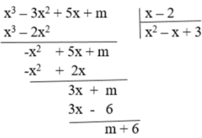Tìm m sao cho đa thức 2x3 +3x2 - 5x + 2 chia cho đa thức 2x + m dư 5
Hãy nhập câu hỏi của bạn vào đây, nếu là tài khoản VIP, bạn sẽ được ưu tiên trả lời.


Đặt \(f\left(x\right)=2x^3-3x^2+x+a\)
Ta có: phép chia \(f\left(x\right)\) cho \(x+2\) có dư là \(R=f\left(-2\right)\)
\(\Rightarrow f\left(-2\right)=2.\left(-2\right)^3-3.\left(-2\right)^2+\left(-2\right)+a\)
\(f\left(-2\right)=2.\left(-8\right)-3.4-2+a\)
\(f\left(-2\right)=-16-12-2+a\)
\(f\left(-2\right)=-20+a\)
Để \(f\left(x\right)\) chia hết cho \(x+2\) thì \(R=0\) hay \(f\left(-2\right)=0\)
\(\Rightarrow-20+a=0\Leftrightarrow a=20\)

Lời giải:
a.
\(C(x)=A(x)+B(x)=(2x^3-3x^2-x+1)+(-2x^3+3x^2+5x-2)\)
\(=(2x^3-2x^3)+(-3x^2+3x^2)+(-x+5x)+(1-2)=4x-1\)
b.
$C(x)=4x-1=0$
$\Rightarrow x=\frac{1}{4}$
Vậy $x=\frac{1}{4}$ là nghiệm của $C(x)$
c.
\(D(x)=A(x)-B(x)=(2x^3-3x^2-x+1)-(-2x^3+3x^2+5x-2)\)
\(=2x^3-3x^2-x+1+2x^3-3x^2-5x+2\)
\(=4x^3-6x^2-6x+3\)

Lời giải:
a. $f(x)=x^4-3x^2+2x-7=x^3(x+2)-2x^2(x+2)+x(x+2)-7$
$=(x+2)(x^3-2x^2+x)-7=g(x)(x^3-2x^2+x)-7$
Vậy $f(x)$ chia $g(x)$ được thương là $x^3-2x^2+x$ và dư là $-7$
b. Theo phần a $f(x)=(x^3-2x^2+x)g(x)-7$
Với $x$ nguyên, để $f(x)\vdots g(x)$ thì $7\vdots g(x)$
$\Leftrightarrow x+2$ là ước của $7$
$\Rightarrow x+2\in\left\{\pm 1;\pm 7\right\}$
$\Leftrightarrow x\in\left\{-3; -1; 5; -9\right\}$
c.
Theo định lý Bezout về phép chia đa thức, để $K(x)=-2x^3+x-m\vdots x+2$ thì: $K(-2)=0$
$\Leftrightarrow -2(-2)^3+(-2)-m=0$
$\Leftrightarrow 14-m=0$
$\Leftrightarrow m=14$

Để \(2x^3-5x^2+6x+m⋮2x-5\) thì :
\(2x^3-5x^2+6x+m=\left(2x-5\right)\cdot Q\)
Đặt \(x=\frac{5}{2}\)ta có :
\(2\left(\frac{5}{2}\right)^3-5\left(\frac{5}{2}\right)^2+6\cdot\frac{5}{2}+m=\left(2\cdot\frac{5}{2}-5\right)\cdot Q\)
\(15+m=0\)
\(m=-15\)
Vậy........
Bài làm chỉ mang t/c tham khảo,chưa biết đúng hay sai.
Ta có: \(\frac{2x^3-5x^2+6x+m}{2x-5}=\frac{2x^3-5x^2+2x-5+4x+5+m}{2x-5}\)
\(=1+\frac{2x^3-5x^2+4x+5+m}{2x-5}=1+\frac{2x^3-5x^2+2x-5+2x+10+m}{2x-5}\)
\(=2+\frac{2x^3-5x^2+2x+10+m}{2x-5}=3+\frac{2x^3-5x^2+15+m}{2x-5}\)
\(=104+\frac{1}{15}m\).
Để \(2x^3-5x^2+6x+m⋮2x-5\) thì \(\frac{1}{15}m\) là số nguyên hay \(\frac{m}{15}\) nguyên hay \(m\in B\left(15\right)\)

1) \(\Leftrightarrow\left(x-4\right)\left(x+4\right)-x\left(x-4\right)=0\)
\(\Leftrightarrow\left(x-4\right)\left(x+4-x\right)=0\)
\(\Leftrightarrow\left(x-4\right)4=0\)
\(\Leftrightarrow x=4\)
2) \(\left(x+3\right)^2-\left(x-3\right)\left(x+5\right)=x^2+6x+9-x^2-2x+15=4x+24\)
3) \(2x^3+3x^2-2x+a=2x^2\left(x-2\right)+7x\left(x-2\right)+16\left(x-2\right)+32+a\)
Để \(2x^3+3x^2-2x+a⋮x-2\) thì \(32+a=0\Leftrightarrow a=-32\)
1.
x2 - 16 - x(x - 4) = 0
<=> (x2 - 42) - x(x - 4) = 0
<=> (x - 4)(x + 4) - x(x - 4) = 0
<=> (x + 4 - x)(x + 4) = 0
<=> 4(x + 4) = 0
<=> x + 4 = 0
<=> x = -4
2.
(x + 3)2 - (x - 3)(x + 5)
= x2 + 6x + 9 - (x2 + 5x - 3x - 15)
= x2 + 6x + 9 - x2 + 5x - 3x - 15
= x2 - x2 + 6x + 5x - 3x + 9 - 15
= 8x - 6

\(\Leftrightarrow2x^3+x-a=\left(2x-5\right)\cdot a\left(x\right)\)
Thay \(x=\dfrac{5}{2}\Leftrightarrow2\cdot\dfrac{125}{8}+\dfrac{5}{2}-a=0\Leftrightarrow a=\dfrac{135}{4}\)


A(x) chia cho B(x) có số dư bằng 2 nên 102 – 5m = 2 ⇒ -5m = 100
⇒ m = 20
